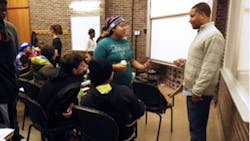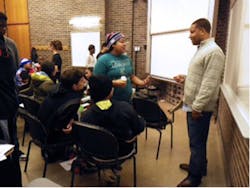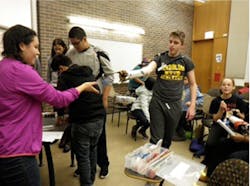SYNCERE Effort: Three Chicagoans Take Leap of Faith to Promote STEM
One recent Saturday morning, while many teenagers were sleeping in or just hanging out, a group of area high-school students was gathered in a lecture hall at the University of Illinois at Chicago (UIC), working in small teams, each challenged to design and build a functioning prosthetic arm.
“We still have to make some adjustments,” a freshman named Amatullah said of work needed to make her team’s arm—created with a budget of $40 and fashioned out of an adjustable strap, a cardboard tube, and a trash gripper—capable of turning a bolt around a screw.
As Amatullah and her teammates, Jahlil and Yusuf, formulated a plan for extending their machine’s range of motion, the low, kind voice of Jason Coleman could be heard as he helped another team brainstorm ways to increase the strength of its arm’s grip.
Coleman is co-founder and executive director of Project SYNCERE (Supporting Youth’s Needs with Core Engineering Research Experiments), a non-profit organization dedicated to “increas(ing) the number of minority, female, and under-served students pursuing careers in the fields of science, technology, engineering, and mathematics (STEM).”
Beginnings
Growing up on Chicago’s South Side, Coleman excelled in math and science. Yet it was not until his arrival at the University of Southern California that Coleman discovered a field of study that suited him.
“I talked to my career counselor in college about the things that I liked to do: working with my hands, building things, designing,” Coleman recalled. “From what she described of engineering, it sounded like the perfect fit.”
As Coleman discovered his passion, others, it seemed, had missed out.
“I was the only black male in my engineering classes,” Coleman said. “That made me start to do some deep thinking.”
After graduating with a bachelor’s degree in mechanical engineering in 2001, Coleman went to work for BAE Systems, designing and developing flight control systems for military and commercial aircraft, and then Motorola, developing mechanical layouts for cellular phones. He loved his work, but felt something was missing.
“I always wanted to do a little bit more,” Coleman said.
In his free time, Coleman volunteered, working with young people. As he took inventory of the professionals in his field and recalled his own experiences in education, he realized he wanted to give his full attention to promoting STEM to minority students. So, with fellow South Siders Seun Phillips, who was working as a senior electrical engineer for Motorola, and George Wilson, who was working at Northwestern University, where he specialized in grant-proposal budgets and managing funds awarded to faculty in the Life Sciences department, Coleman founded Project SYNCERE in 2008.
‘Leap of Faith’
Coleman knew moving from a high-paying, in-demand corporate job to the non-profit sector meant his life would change. But he was willing to take what he referred to as a “leap of faith.”
“We didn’t have any seed money,” Coleman said. “We didn’t have any grant money. We really advanced our own resources into starting this venture. But I believe that, without risk, there’s no reward.
“We started with one after-school program at a school on the South Side of Chicago,” Coleman continued. “From there, the Chicago public school system really started to buy into it.”
Local universities began offering partnerships, while corporations, including Coleman and Phillips’ former employer, Motorola, invested in the project. Before long, Project SYNCERE began to grow, offering more opportunities for the children of Chicago to be exposed to STEM.
Programs
Today, Project SYNCERE serves 1,200 to 1,500 students in grades 4-12 a year through:
- In-school programs. Project SYNCERE instructors visit Chicago public schools to supplement the curriculum with hands-on technology and engineering projects. Aimed at younger children, the programs are intended to plant seeds of excitement in STEM.
- After-school enrichment programs that provide an introduction to various engineering disciplines.
- Project SYNCERE’s Emerging Engineers Program (PSEEP). Reserved for middle-school and high-school students, who go through a rigorous application process, PSEEP provides in-depth study of various engineering fields. Students meet on Saturdays, creating models of technological devices, building portfolios for continued educational opportunities. Two 11-week programs—one in the fall, the other in the spring—are held each year. Approximately 25 high-school students and 50 middle-school students are accepted each year.
- Summer STEM camps. Project SYNCERE partners with educational, civic, and philanthropic organizations to provide an intensive summer program involving hands-on exploration of engineering principles.
- Services including parent-child STEM workshops, teacher professional development, and parent technology workshops.
Project SYNCERE’s staff consists of five full-time employees who handle day-to-day business and 16 part-time instructors.
“All our teachers are engineers themselves, so the students don’t just get knowledge—they benefit from the experiences of people already in the field,” Coleman said.
Allowing Room for Error
While the high-school students that Saturday morning at the UIC created prosthetic arms, the middle-school students had a project of their own: design a prototype for Mars rover wheels. The challenge, specifically, was to propel a miniature vehicle forward in a large shallow container full of sand. Wheels were covered in everything from foil to balloons to pipe cleaners.
“You’re going to fail a lot!” a student who covered her wheels with half-melted marshmallows said. “But you get up and try again after you do.” She explained how the shortcomings of her initial design led to the creation of her new one.
“This hands-on learning allows the children to really grasp the concepts they’ve learned,” Monica Perry, a civil engineer and Project SYNCERE instructor, said. “Of course, we have a process. We provide tasks, materials, and guidance. But then we encourage them to use their creative minds. You want them to have room to fail because you want them to know that, in engineering, that’s actually an outcome. But are we going to let kids get discouraged or feel bad about themselves? No. We always remind them that what they make may not work.”
Imparting Marketable Skills
Project SYNCERE seeks to prepare students for the world far beyond high school, offering, for instance, career panels, resume workshops, and sessions on presentations and public speaking.
One student, who held an internship at particle-physics and accelerator laboratory Fermilab, believes Project SYNCERE’s hands-on, deadline-oriented assignments and the experience she is gaining working as part of teams will increase her chances of gaining admission to one of her top choices of university: Northwestern or Michigan.
Coleman told the story of a student who, through Project SYNCERE, went from having no direction to finding a passion for mechanical engineering. The young man went on to earn a full four-year scholarship and is now completing several internships. And three years ago, Coleman met a freshman in high school who was hoping for guidance on increasing her chances of getting into top schools and winning scholarships. Due in part to Coleman’s mentoring, she is studying abroad on scholarship and applying to MIT (Massachusetts Institute of Technology) and Stanford University with confidence.
How to Get Involved
Project SYNCERE is growing quickly, as is its need for resources. Coleman discussed Project SYNCERE’s search for corporations with which to partner. Companies can get involved in a number of ways, he said, including providing donations, equipment, and volunteers.
“A lot of these industries have an aging workforce, and it’s important for them to continue to find people that are going to be able to replace those current engineers,” Coleman said.
Individuals can participate in different ways, ranging from serving on a Saturday career panel to becoming an instructor, like Monica Perry.
“Working with Project SYNCERE has allowed me to really integrate my engineering background with my love of teaching,” Perry said. “It’s changed my life.”
Beyond Project SYNCERE, Coleman encourages engineers to mentor.
“Our cities, our streets, our buildings—these depend upon engineers,” Coleman said. “We need to start thinking about collaborative ways to inspire future generations.”
For more information on Project SYNCERE, including partnership and volunteer opportunities, go to www.projectsyncere.org.
Amanda Muledy is a Chicago-based freelance writer, editor, and designer. She can be contacted at [email protected] and 630-544-7741.


